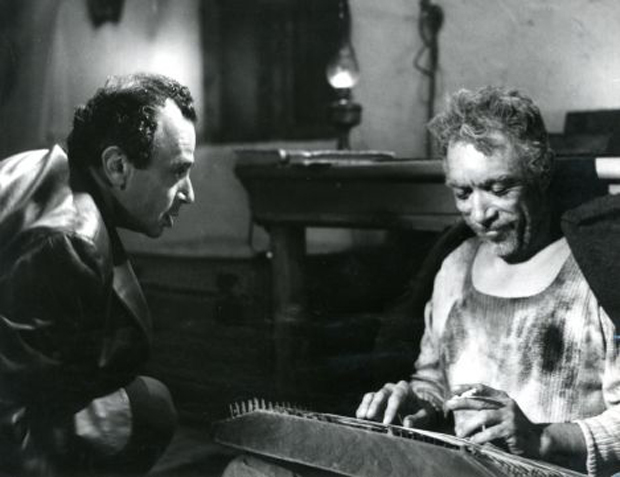An iconographic and text archive related to communication, technology and art.
☛ Michael Cacoyannis Foundation: Michael Cacoyannis (left) and Anthony Quinn (right) during the shooting of Zorba the Greek, c. 1963 (the film was released in 1964), unknown photographer.
There is some confusion about the year Michael Cacoyannis was born in the documents I’ve searched online. Most media, as well as the English Wikipedia, the Greek Wikipedia and IMDb pages dedicated to the cinematographer have him born on June 11, 1922 (at least they at the moment of this writing). That was also the information displayed by the Michael Cacoyannis Foundation until a few days ago (I’ve consulted a cached version of the biography dated from July 18, 2011). However, as of today, the biography hosted by the MCF now states that he was born in 1921. In its obituary, The Guardian wrote that Cacoyannis died at 90 years old, although it also gives 1922 as the year of his birth. The Washington Post, reproducing a news from the Associated Press, made a similar mistake by writing he was born in 1921, but died at 89. I wrote to the Michael Cacoyannis Foundation to try to get some clarifications. In the meantime I’ll stick with the most common version: born in 1922, died at 89. UPDATE – July 26, 2011 – Eleni Kyprioti, communication manager for the Foundation, replied to my request for clarification with the following answer (I’ve changed the title of this post accordingly):
I would like to inform you that Michael Cacoyannis was born in 1921 and we changed the year of his birth in his biography in order to correct the previous mistake.
Here’s the official announcement of Cacoyannis death by the MCF:
Michael Cacoyannis Foundation announces, in deep sorrow, the passing of the great Greek director, Michael Cacoyannis, Founder and President of the foundation’s Board. […] Michael Cacoyannis has distinguished himself not only as an international filmmaker, but also as a stage and opera director, with critically acclaimed productions in Greece, the U.S. France and other European countries. He has published several screenplays, he has translated Shakespeare’s plays into Greek and Euripides into English, and he has written the lyrics of some of the best-known and best-loved Greek songs.
I’m especially fond ―for various reasons― of his most popular film Zorba the Greek, adapted from the novel of the same name written in 1946 by the great modern novelist Nikos Kazantzakis (1883-1957). I had already read the novel two or three times when I got the opportunity to show a 35 mm copy of Cacoyannis’ film at the small film club I was running in college. I had asked my father to come and to present it to the audience. I still cherish the memory of that evening. Later, during my first year as a university student, I wrote a paper examining the influence of Nietzsche’s essay The Birth of Tragedy (1872) on Kazantzakis’ novel. I was able to understand a little better what had fascinated me about the character of Zorba.
In this perspective, it just seems natural to me to salute the passing of Michael Cacoyannis with a quote from the prologue of Report to Greco (1961) an autobiographical novel by Kazantzakis:
Extending my hand, I grasp earth’s latch to open the door and leave, but I hesitate on the luminous threshold just a little while longer. My eyes, my ears, my bowels find it difficult, terribly difficult, to tear themselves away from the world’s stones and grass. A man can tell himself he is satisfied and peaceful; he can say he has no more wants, that he has fulfilled his duty and is ready to leave. But the heart resists. Clutching the stones and grass, it implores, “Stay a little!”
I fight to console my heart, to reconcile it to declaring the Yes freely. We must leave the earth not like scourged, tearful slaves, but like kings who rise from table with no further wants, after having eaten and drunks to the full. The heart, however, still beats inside the chest and resists, crying, “Stay a little!” (translated by P. A. Bien, London: Faber & Faber, 1965, p. 18)
Below are more online resources about Michael Cacoyannis.
- The Telegraph: “Michael Cacoyannis” July 25, 2011:
Michael Cacoyannis, who died on July 25 aged 89, was the first Greek film-maker to achieve international renown, later becoming a respected theatrical and operatic producer in Paris, Frankfurt and New York.
- The Guardian: “Michael Cacoyannis dies aged 90” by Andrew Pulver, July 25, 2011:
Multi-award-winning Cypriot film-maker Mihalis Kakogiannis, best known for the 1964 hit Zorba the Greek starring Anthony Quinn, has died at the age of 90, it has been reported. Kakogiannis, who was billed under the name Michael Cacoyannis for his English-language productions, was nominated in three separate Oscar categories for Zorba (including best director), and became a regular in competition at Cannes.
- The Associated Press via The Washington Post: “‘Zorba the Greek’ director Michael Cacoyannis dies at 89”, July 25, 2011
- TMC – Turner Movie Classics: “Zorba the Greek”. An interesting document about the context in which the film was made and how it was received. Many anecdotes are taken from Anthony Quinn’s memoir One Man Tango (1995).
- Walter Lassaly was the director of photography on Zorba the Greek. He won the Academy Award for Best Cinematography (Black-and-White) in 1965 for his work on the film. Lately, he recorded 13 short interviews about different aspects of the production process on Cacoyannis’ famous film. One can watch them all for free online at Web of Stories (Flash is required).
- By Philippe Theophanidis
- on
- ― Published in Art, Movies, Politic
- Tagged: Cacoyannis, Greece, Kazantzakis, obituary, Zorba, Καζαντζάκης, Κακογιάννης

